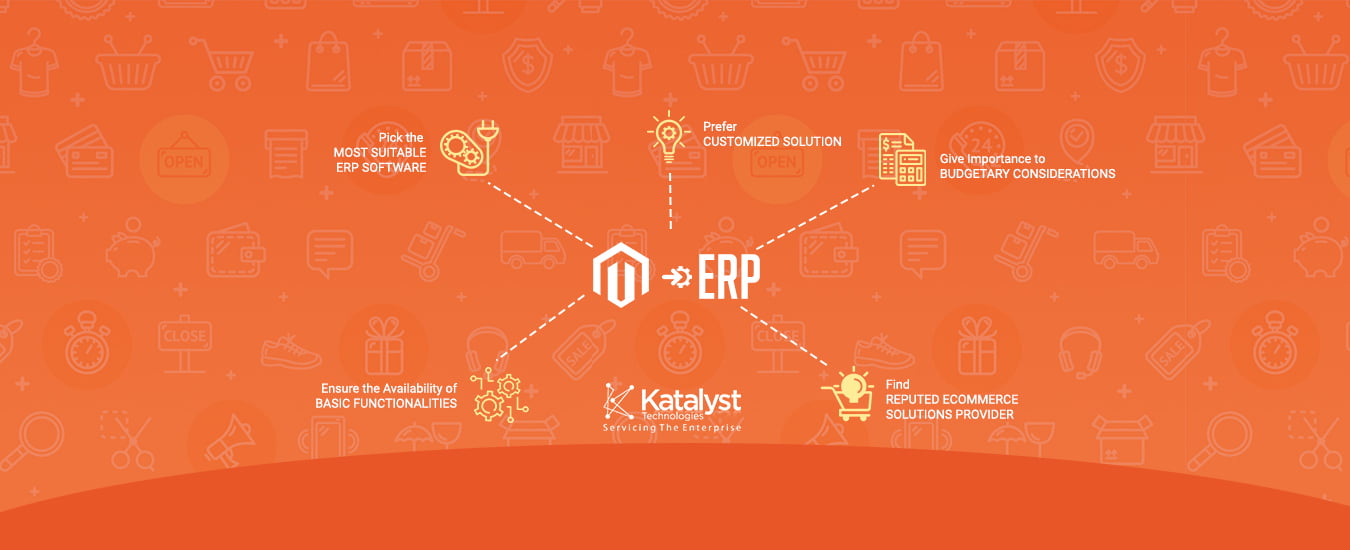
Magento ERP integration is a strategic action that directly improves the bottom-line of the ecommerce business. With reliable ERP software to back your ecommerce website, your business will no longer be operational under data silos or will face setbacks in the absence of accurate and real-time inputs. Moreover, as Industry 4.0, fourth industrial revolution driven by digitization will hit maximum industries in 2020, modern ERPs will be undoubtedly powered by disruptive tech like Artificial Intelligence, Machine Learning, Blockchain, Automation, and Internet of Things to support business needs. Needless to say, the decision to integrate your Magento ecommerce platform with robust ERP Integration Best Practices software would bring significant benefit like enhanced customer experience, thus, giving a competitive edge to your business in 2020.
However, to achieve this end, it is crucial that your ecommerce website smoothly aligns with ERP software to create visibility at every link of the supply chain, thus creating a seamless collaboration between the front end and back end. You can follow these best practices in 2020 to ensure that the chosen ERP software is correctly mapped with the Magento ecommerce platform; thus, ruling out any possibility of misalignment and miscommunication.
Best Practices in 2020 for Integrating ERP with Magento
1. Pick the most suitable ERP software: It is a fact that the market is flooded with ERP systems, and picking the right solution for your business can be a daunting task. To begin with, you must understand what type of ERP platform you need to achieve your goals. There are industry-specific cloud-based ERP and on-premise ERP solutions available from which you can choose depending upon your budget and technical limitations. Secondly, before selecting an ERP software, you must assess whether the underlying mechanisms in an ERP aligns with the business model of your ecommerce website. It is worth remembering that an ERP for the retail industry is altogether different from an ERP for the manufacturing industry.Businesses must perform a gap analysis to locate the specific requirements of the ecommerce business and then explore ERP software that caters to the needs of the retail industry. For example, an ERP solution for ecommerce platforms must possess omni-channel capabilities to manage various customer touch points. It should be flexible to handle multiple warehouses in real-time, support CRM, order management, and offer EDI integration capabilities for data to flow smoothly.
2. Ensure the availability of basic functionalities: Contemporary ERP solutions are laden with numerous advanced elements. As a business, you must understand that not every feature is relevant to your needs. However, the basic features like order management, stock management, data analytics, customer relationship management, finance and accounting management, shipping, and distribution management must be present as a prerequisite. It is essential to ensure that the chosen ERP software must resonate with the critical components of your Magento ecommerce platform and create synergies on pairing. The best part with Magento ecommerce platforms is that its framework is highly compatible and can be integrated with almost any ERP solution.
3. Prefer customized solution: Customization is a profitable strategy when it comes to picking software to streamline your business processes. With custom solutions, you can get mission-critical features while eliminating the redundant ones within your budgetary stipulations, which are not available if you opt for a standard off-the-shelf product. Many reputed ERP solutions offer ecommerce ad-on and specific modules with robust ecommerce capabilities that align with Magento. Thus, it is recommended to choose bespoke ERP software yielding higher efficiencies.
4. Give importance to budgetary considerations: Magento ERP integration is a cost-intensive exercise, especially if you are implementing an ERP from scratch. Various parameters affect the cost of integration that should be assessed before committing resources. For example, SaaS-based ERP is available on the subscription model under which you pay as per your usage. On the other hand, an on-premise ERP is installed on the IT hardware at your business premises and calls for higher cost and maintenance. Moreover, before selecting a particular ERP for integrating with the Magento ecommerce platform, you must check if the solution is scalable and will not ask for more monetary investment.Further, you can also choose between a fully automated and semi-manual option. Another worth-mentioning point is that a tailored solution is expensive than pre-built ERP software. Thus, you need to find a trade-off between the two for a cost-effective integration process.
5. Find a reputed ecommerce solutions provider: Lastly, you must consider a reliable integration partner for this project to avoid any mishaps while mitigating risks of ERP Magento integration failure. Your internal team may be successfully handling the Magento ecommerce platform, but integrating it with a massive solution like ERP can be challenging and sensitive. Thus, instead of handling in-house, it is always advisable to handover the project in safe hands who have experience and examples to prove their brilliance.
Katalyst Software Services Limited: A Reliable Partner for Integrating ERP with Magento in 2020
Your quest to search a credible tech partner for Magento ERP integration can successfully end at Katalyst Software Services Limited. We are a leading digital and ecommerce solutions provider who offers comprehensive solutions, including web-based development, ERP, and enterprise applications integrations. Our product Celero ERP is a sophisticated solution that seamlessly integrates with retail and ecommerce platforms, including Magento, Shopify, WordPress, Drupal Commerce, and BigCommerce.
Contact our experts for a free consultation.

